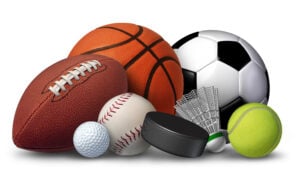This Could Be The College Athlete NIL Bill That Ends Up Becoming Law
Restrictions are likely to be suggested by a new 13-member commission that is proposed to be established by the law and then be terminated roughly three years after its creation.

(Image via Getty)
The most practical and realistic federal legislation focused on providing college athletes the right to exploit their names, images, and likenesses (NIL) for commercial gain was just recently co-authored by a Democrat and a Republican. The bipartisan bill, written by Representative Anthony Gonzalez (R-Ohio) and Representative Emanuel Cleaver (D-Mo.) may be cited as the “Student Athlete Level Playing Field Act” and its main purpose is to prohibit the NCAA and universities from preventing college athletes from participating in athletics because they enter into endorsement contracts or agency contracts.
The concept is not new. New Jersey recently became the fifth state to promise NIL rights to college athletes, and Florida is currently situated to be the first to actually afford college athletes such rights as of July 1, 2020. If passed and signed into law, the federal Student Athlete Level Playing Field Act would preempt states like New Jersey and Florida from enforcing their respective laws and regulations that seek to provide their own set of rights to college athletes.

The Business Case For AI At Your Law Firm

The law proposed by Gonzalez and Cleaver seeks to provide widespread rights to college athletes, with a few restrictions. Tobacco brands (including vaping products), alcohol companies, sellers and distributors of controlled substances (including marijuana), adult entertainment businesses, and casinos or entities that sponsor or promote gambling activities would be completely off-limits. It is not yet clear whether that would include season-long and daily fantasy sports operations. Additional restricted categories are likely to be suggested by a new 13-member commission that is proposed to be established by the law and then be terminated roughly three years after its creation. Twelve members of the commission are to be appointed by various high-ranking members of Congress and then those members are to select a 13th member who will serve as the chair of the commission.
College athletes, under the suggested law, will not be able to wear any third-party-provided items of clothing or gear during athletic competitions or university-sponsored events. However, they shall not be barred from entering into contracts with companies that may be deemed competitors of brands that have business relationships with the universities. For instance, the Florida Gators football program has a deal in place with Jordan Brand. Under the bill sponsored by Gonzalez and Cleaver, a football player at the University of Florida would not be able to wear Adidas accessories on the field, but he could wear Adidas-branded shoes at his apartment and post about Adidas on Instagram in exchange for compensation.
What is deemed to be permissible compensation in those categories that are not off-limits remains the tricky part in providing these rights to college athletes. Perhaps the standard of “I know it when I see it,” uttered by Justice Potter Stewart in 1964 to explain what constitutes obscenity in the realm of hard-core pornography prevails. It is not at all clear at this point. What is clear is the intention of the federal government to prohibit improper payments by boosters (commonly sponsors of an athletic program) to college athletes to cause the athletes to enroll or remain at a specific university. While that may be justified in theory, it could be hard to implement in practice.
Sponsored

Legal AI: 3 Steps Law Firms Should Take Now

Is The Future Of Law Distributed? Lessons From The Tech Adoption Curve

Early Adopters Of Legal AI Gaining Competitive Edge In Marketplace

Early Adopters Of Legal AI Gaining Competitive Edge In Marketplace
Darren Heitner is the founder of Heitner Legal. He is the author of How to Play the Game: What Every Sports Attorney Needs to Know, published by the American Bar Association, and is an adjunct professor at the University of Florida Levin College of Law. You can reach him by email at heitner@gmail.com and follow him on Twitter at @DarrenHeitner.
Sponsored

Navigating Financial Success by Avoiding Common Pitfalls and Maximizing Firm Performance








